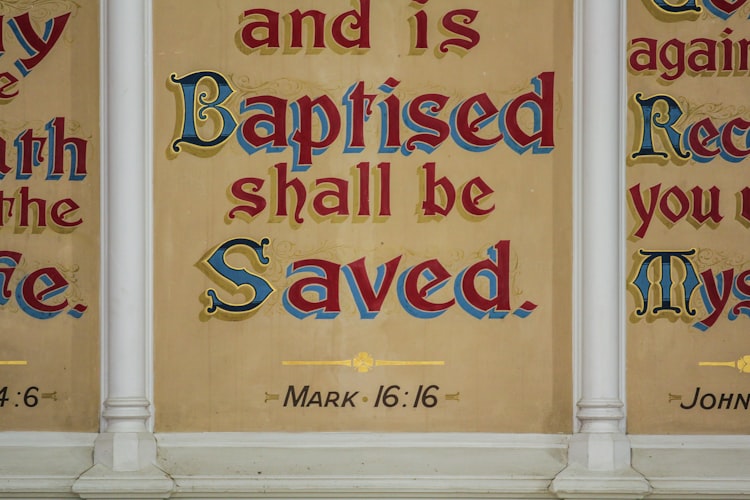Three Reasons to Not be A Christian All By Yourself
Solitary religion is not to be found [in the Gospel]. 'Holy solitaries' is a phrase no more consistent with the gospel than holy adulterers. The gospel of Christ knows of no religion, but social; no holiness but social holiness.
John Wesley, 1739 Preface to "Hymns and Sacred Poems"
I've only ever lived alone for a few short periods, usually between semesters of college. I was fortunate enough to meet and marry Emily while I still was an undergrad, so I did not have a long period of bachelorhood after moving out from Mom and Dad's. During those few times when I did live by myself, though, I found cooking a particularly odious task.
Don't get me wrong. I enjoy a meal prepared with my own two hands. But, personally, I've always found cooking for one to be unsatisfying and not a little discouraging. Cooking in small quantities can be difficult, and—while sitting down to a meal by yourself can be a refreshing experience—it can also get old fast.
That said, eating alone is not impossible. You can do it if you must. The same can't be said for being on a team. Or taking part in a meaningful conversation. Or giving a cat a bath. Some things, by definition, require another human being to make the experience possible.
Just like being a Christian.
Read through the New Testament and you will see that there is a foundational assumption that following Jesus is a group effort. Jesus' commands, the admonishments of Paul and Peter and John, the letters to the churches—they each assume that those who are following Jesus are doing so alongside others. We are to carry each other's burdens (Galatians 6:2), confess our sins to one another (James 5:16), and rejoice and mourn together (Romans 12:15). These are not solo tasks. They assume relationship.
There are many reasons why we shouldn't expect to survive as followers of Jesus when we try to make it on our own, but here are three that I think are most important.
1) WE NEED OTHERS TO INSPIRE US
I've been fortunate enough to know many fellow believers who have inspired me to pursue Christ with more passion and fervor. Observing someone's thirst for knowledge, their ability to console and pastor, their peaceful and irenic demeanor—these mentors and role models have reflected Christ and thus drawn me closer to Christ.
When we attempt to live out our faith in isolation, we will find ourselves without examples of what a Jesus-shaped life looks like. Figuring out how to pray or how to read Scripture will be all up to us because we've never given ourselves the opportunity to learn from someone else with experience and wisdom.
Part of the role of the Church is to give each of us models to imitate and then, eventually, innovate from. Paul was able to confidently say, "Imitate me as I imitate Christ." We ought to be able to say this to each other as well.
2) WE NEED OTHERS TO CHALLENGE US
Having a role model is only one part of growing mature. Every once in a while, someone needs to say to us, "You're wrong." If we truly desire growth and maturity, we have to be willing to invite trusted friends and wise advisors to confront, challenge, and correct us.
Many of us are willing to give lip service to our imperfections. "Oh of course I make mistakes!" we'll claim. But when someone dares points one out, that someone better watch it!
Now I'm not saying the Church is the place where we just go around pointing out each others' foibles. That would be quite destructive. However, I think we should be intentionally looking for relationships in which we can invite critique, accountability, and challenge. When we avoid this, we are likely to continue in our mistakes, weaknesses, and sins much longer than necessary.
No, confronting the parts of ourselves we like the least isn't much fun. It isn't fun when we have to take off our masks and let others see who we really are. But in the context of God's unrelenting grace, we can at least pursue the not-fun parts of growth confident in God's love of us.
3) MY GROWTH DEPENDS ON YOUR GROWTH
Something I think we take for granted in the Bible is the constant use of singular-communal language, i.e. of groups of people being referred to as if they were a single thing. For instance, Paul refers to the persons of the church being "God's building" (1 Corinthians 3:9). Many people—one building. Or we see that the persons of the church make up a single body. "If one part suffers, every part suffers with it; if one part is honored, every part rejoices with it" (1 Corinthians 12:26).
The most obvious example of this singular-communal language is in Joshua 7, when a single individual, Achan, stole some of the spoils of war from Jericho. Because of his individual sin, the whole of the people of Israel suffered. And when he repented, the whole of Israel became victorious.
This shouldn't be overlooked. Our connectedness has implications. We can inspire each other or we can derail each other's efforts towards growth. We can share each other's pain and lessen each other's burdens or we can do precisely the opposite. Yes, I am responsible for myself and my relationship with Christ. But I'm responsible for you too, just as you are responsible for me. If I am too immature to inspire you, if you are too immature to challenge me, then we end up immature together. The blind leading the blind.
But when we seek Christ together, we get stronger together.
"Two are better than one. If either of them falls down, one can help the other up. But pity anyone who falls and has no one to help them up . . . Though one may be overpowered, two can defend themselves. A cord of three strands is not quickly broken"Ecclesiastes 4:9-12




Comments ()